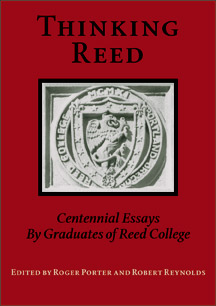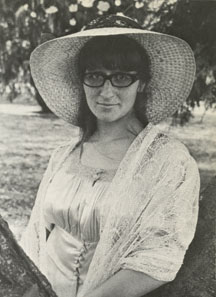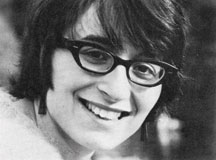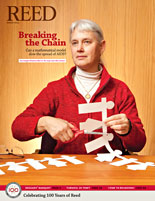
IRIS login | Reed College home Volume 91, No. 1: March 2012
Thinking Reed: Centennial Essays
The Rest is History
How Reed shaped my career as a historian.
By Susan Strasser ’69

For Reed’s centennial, Professors Roger Porter [English] and Robert Reynolds [physics] edited Thinking Reed, a volume of essays by Reed alumni from each of the college’s academic departments who have distinguished themselves in their chosen field, be it history, medicine, journalism, or barbeque. The 33 authors reflect on the creative and often unpredictable ways that Reed inspired them, engaged them, and challenged them, and how they discovered in themselves the taproot of their achievements. This essay is adapted from Thinking Reed. You can purchase the entire book for a mere $19.95.

Susan Strasser ’69 (pictured above in her student days) has been praised by the New Yorker for “retrieving what history discards: the taken-for-granted minutiae of everyday life.” Her books detail the creation of an American consumer culture. She did graduate work at SUNY Stony Book, and has taught at Evergreen State College, Princeton, George Washington, the Bard Graduate Center, and the University of Delaware, where she is Richards Professor of American History. Susan will speak to the Boston alumni chapter on March 28, 2012.

Her older sister, the late Judy Strasser ’66
I first heard of Reed from my older sister Judy. Judith Strasser ’66, history major, Phi Beta Kappa, was the author of a thesis about the history of Reed, and, later in her life, author of two published books of personal prose and two of poetry. I was a freshman when she was a senior, and she was a force. “From my (freshman) point of view,” a friend wrote me after Judy’s death in 2009, “she was a Reed icon, standing for all that was good and noble about the place.” I wish I had Judy to talk to about this essay: she thought about first-person writing more, and more seriously, than I. Not that it would have been easy to start the conversation: she would have been envious that I was chosen to contribute to this collection. But we were starting to do pretty well with our rivalries, and I like to think we would have weathered the hard parts so I could have had the benefit of her response.
我的
不
My interest in women’s history stemmed directly from my interest in contemporary feminism, an outgrowth of some years of progressive politics. In the seventh grade I had started hanging out with young Quakers and Unitarians doing ban-the-bomb and civil rights politics when Judy became friendly with them and let me tag along. I started college in the fall of 1965, five months after attending the first Washington protest against the war in Vietnam and two months after Bob Dylan went electric at the Newport Folk Festival. I graduated in 1969, five months after the Paris peace talks opened and two months before Woodstock. At Reed I was active in the movement against the war, and in what I believe to have been Reed’s first food co-op and first consciousness-raising group. And I was witness to and participant in Reed’s struggles over educational policy, over which those young faculty were fired.
Forty years later, I am grateful for the opportunities my generation had to believe in a relationship between serious critique and meaningful change, to make noise in favor of freedom and love, to grapple with exciting and fluid ideas about history, politics, art, food, music, and everything else that mattered.
我
我的


LATEST COMMENTS
steve-jobs-1976 I knew Steve Jobs when he was on the second floor of Quincy. (Fall...
Utnapishtim - 2 weeks ago
Prof. Mason Drukman [political science 1964–70] This is gold, pure gold. God bless, Prof. Drukman.
puredog - 1 month ago
virginia-davis-1965 Such a good friend & compatriot in the day of Satyricon...
czarchasm - 4 months ago
John Peara Baba 1990 John died of a broken heart from losing his mom and then his...
kodachrome - 7 months ago
Carol Sawyer 1962 Who wrote this obit? I'm writing something about Carol Sawyer...
MsLaurie Pepper - 8 months ago
William W. Wissman MAT 1969 ...and THREE sisters. Sabra, the oldest, Mary, the middle, and...
riclf - 10 months ago